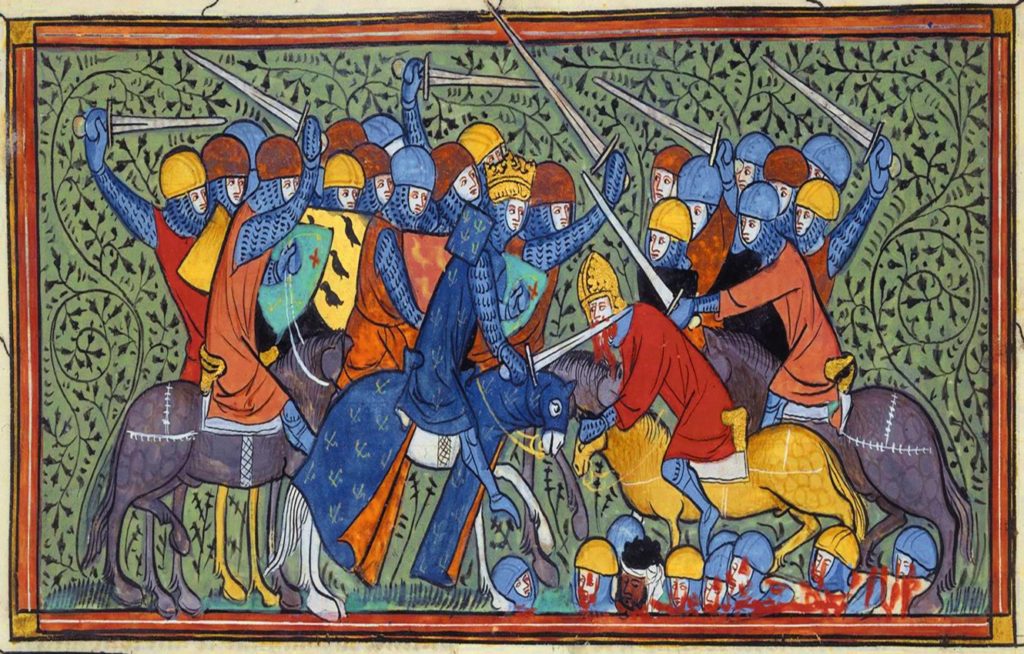Warlord
Warlord is a broad term. It is usually bestowed on a character that leads troops and some negative connotations are associated with it. Many view warlords as just a leader of warriors or a high ranking member of a group of mercenary men dedicated to nothing more than war.
In a way this is true, but more nuanced. The title of Warlord can easily be applied to any noble that is trained for war and willing to lead soldiers into combat. Indeed, many high ranking nobles, kings and emperors are technically warlords. In the 9th Century AD, many kings are expected to lead from the front, or at least be close by to observe important battles. This helps raise morale of their troops, and allows many to make sure that their battle plans are carried out correctly.
An example is King Charlemagne, a powerful fighter in his own right, he grew up in a military society that favours strength of arms. Indeed, the Franks have some of the most feared mounted troops in Europe, as well as large axe-wielding infantry units. By combining these with levies, especially for skirmish troops & archers, allows Charlemagne a broad range of general troops. Any units he doesn't have at hand can be hired as mercenaries, or conquered & added to his sizeable military assets.
Many empires start the same way, when a warlord appears in a tribe or clan, and leads their respective troops to war. When they do, they have the chance of attracting further diverse groups to their cause, creating a large fighting force. Many warlords have to have a certain charisma to them, and a certain amount of diplomacy too. Considering that going on a blind rampage means that any military venture will soon burn out. This would be for a number of reasons, usually through infighting, backstabbing, and ineffective overall leadership.
Career
Qualifications
Most warlords are born into the role. Most are either nobles in their society and trained lead & fight, or in the right place at the right time. The latter is especially true of low born individuals who take command & work their way into a position of power.
A good and/or instinctive knowledge of leadership, battlefield experience, and a thirst for dominance are all excellent qualifications for this.
Career Progression
Some, such as kings, are born into this role, and they are expected to be able to lead almost from birth. Others work their way up the ranks being viewed as the perfect warrior in their society that embodies their ability to fight and lead troops.
Payment & Reimbursement
Most in this leadership position has the pick of any loot, along with gaining land, titles, and prestige. They get access to technologies and skilled individuals to their courts.
Other Benefits
Most warlords are viewed as superior fighters & leaders, and respected or feared by many. They command vast empires with wealth uncounted, trade routes, lands, titles, the ability to create or sign off laws in their lands, and powerful allies in many other regions. They have access at this stage to the finer aspects of life.
Perception
Purpose
A warlord fulfils the need of a leader during times of war.
Social Status
Depending on the society and the stability of the region, a warlord will be viewed in a number of ways. They will be welcomed as a focal point during a conflict, or a hinderance in times of peace. Depending on this, the warlord can easily fall from grace if they are overly aggressive in expansion of their peoples territory, or welcomed if a threat emerges. Every warlord needs to know when to step back from the title.
Demographics
There is very few in any given society that has this title, and many will adopt other titles instead. Most are nobles or others in a position that authority can be easily grasped.
History
The profession grew out of early tribal customs. A leader would have emerged and led their people on a widespread rampage to take on territory and / or resources. Usually they went to separate ways, they kept going and burned out disappearing after a while, or they took leadership roles such as chieftains, or kings. The latter can also explain how a group of nobles eventually evolved too in some societies where the warrior groups would bond together and when the original warlord took to a pure leadership role there was still a need for those who could lead troops.
"Every society has it's warlords son, every society... We aren't the only society that does. Wherever there is the risk or war, or the chance to expand a society's resources there will always be someone there to lead the army. Whatever you call the leader, whether Chieftain, King, Jarl, Emperor, whatever. They are nothing more than a Warlord. Everything else is just a fancy title to make the commoners feel safe, and to get everyone in a line."
Niall the Serpent Caller, Arch Druid of the Ulaid, talking to Ale Storm.
Type
Military



Comments